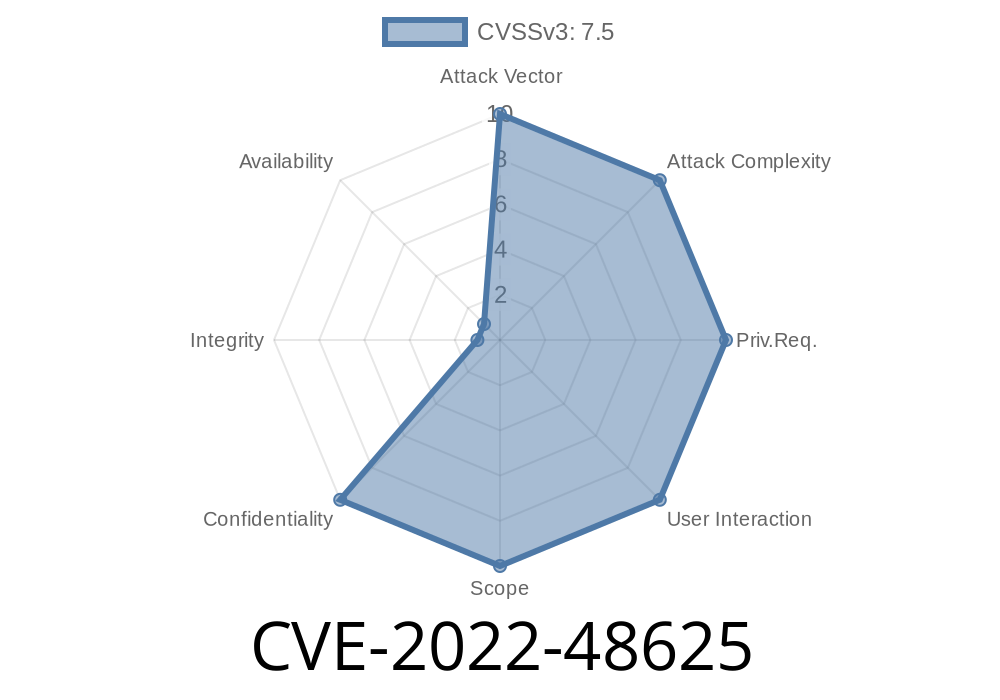When it comes to securing your organization's communications infrastructure, even a small oversight can turn into a wide open door for attackers. A recent and critical security vulnerability—CVE-2022-48625—in the Yealink Config Encrypt Tool is a prime example. Let's dive into what happened, how attackers can break it, and what you can do if your systems are affected.
What is CVE-2022-48625?
CVE-2022-48625 is a vulnerability found in Yealink's Config Encrypt Tool for Windows, versions before 1.2. This tool is used to encrypt and decrypt the configuration files for Yealink’s range of voice-over-IP (VOIP) phones. The problem? It ships with a built-in (hard-coded) RSA key pair for its cryptographic operations. This directly exposes confidential configuration secrets to potential attackers.
Why Is This Key Hard-Coded?
For “ease of use,” the tool’s developers included a single, universal RSA private/public key pair inside the application code. This means that anyone who gets the tool—or even just reverses the application binary—can extract the key pair. Since the encrypted configuration files can be decrypted using the same keys, it effectively means no secret is safe.
Since the public and private RSA keys are identical across all installations
1. Attacker obtains an encrypted config file—for example, grabbed from a phone’s backup or an intercepted file transfer.
2. Attacker uses the built-in private key, easily found through reverse engineering or via published sources, to decrypt the config.
3. Credentials and sensitive information are exposed—such as SIP passwords, administrative access, server addresses, and more.
Proof-of-Concept: Decrypting a Yealink Config
Assume you have a configuration file named config_encrypted.cfg. Here’s how an attacker could decrypt it:
1. Extract the RSA Private Key
Imagine this is the private key found in the binary of the vulnerable tool (for illustration, this is an example key):
-----BEGIN RSA PRIVATE KEY-----
MIIEowIBAAKCAQEAtWyJloiKR7Nl/T...
...snipped for brevity...
-----END RSA PRIVATE KEY-----
With the private key saved as private.pem, the attacker could run
openssl rsautl -decrypt -inkey private.pem -in config_encrypted.cfg -out config_decrypted.cfg
Now the attacker has your decrypted configuration, with all internal secrets exposed.
Access the plain config, possibly including
- SIP credentials (to make/monitor calls)
Who is at Risk?
- VOIP administrators who use Yealink phones and the Config Encrypt Tool for managing configurations, especially in automated provisioning environments.
- Organizations using legacy device firmware that doesn’t support stronger/key-unique encryption.
Original References
- Mitre CVE-2022-48625 Listing
- Yealink Website
- Full Disclosure Thread: “Yealink Config Encrypt Tool - Hardcoded RSA Key Pwnage”
- Sample Private Key Pastebin (for educational review only)
Lessons Learned
This is a textbook example of why *hard-coded cryptographic keys* are a grave risk and never an option for real-world protection. Centralized key use means, in effect, *no security at all*. Attackers, security researchers, and even everyday users can now decrypt any encrypted Yealink config file, regardless of where it was created.
Always use cryptography right: generate unique keys, and never bake secrets into software.
If you use Yealink, check your infrastructure *now*—and don’t forget to warn others whom this may impact!
Want to dig deeper or need advice on remediating Yealink vulnerabilities? [Contact us](mailto:securityhelp@example.com) or follow us for more updates on embedded device and VOIP security.
Timeline
Published on: 02/20/2024 00:15:14 UTC
Last modified on: 08/29/2024 20:35:08 UTC
